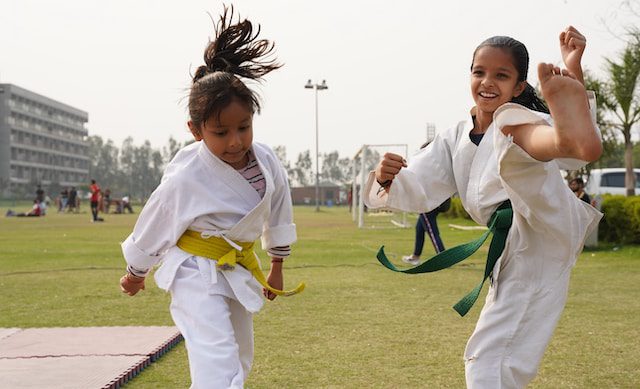Kids looking for a fun, demanding, and disciplined activity are increasingly choosing Mixed Martial Arts (MMA). Young practitioners frequently face roadblocks that prevent them from moving forward as they embark on their path. Their learning process can be greatly improved by being aware of and responding to these typical errors. Here, we look at the main mistakes made by young MMA practitioners and offer advice on how to avoid them for a successful martial arts career.
Table of Contents
1. Neglecting Basics for Fancy Techniques
One of the most common errors made by kids mixed martial arts enthusiasts is their tendency to pick up showy or advanced techniques before they have mastered the fundamentals. Kids who don’t grasp the fundamentals may be tempted by the thrill of pulling off difficult movements they’ve seen in matches or videos. Ignoring fundamental procedures might slow one’s advancement and result in deficiencies in one’s skill set.
Solution: Insist that learning the fundamentals is crucial. Strive to make basic movements like footwork, stance, basic strikes, and grappling skills a regular exercise. Before teaching students more complex methods, coaches and instructors should design their sessions with a good foundation in mind.
2. Overlooking Defense
Many kids mixed martial arts practitioners are so excited about learning attacking techniques that they forget how important defense is. Whether it’s dodging takedowns, blocking blows, or staying in the right posture to avoid submissions, defense is an essential part of mixed martial arts.
Solution: Implant in children the importance of protective techniques from an early age. Include defensive exercises in training sessions to highlight the value of self-defense while teaching attacking techniques. This all-encompassing method lowers the chance of injury during sparring or competition and guarantees a well-rounded skill set.
3. Lack of Patience and Persistence
Kids who don’t experience quick improvement in their mixed martial arts skills could get discouraged in this culture of rapid gratification. When they don’t immediately pick up a method, they could get impatient or anticipate quick progress.
Solution: Encourage perseverance and patience. Describe how, similar to any other sport, mixed martial arts advancement requires patience, commitment, and persistent work. To increase their self-esteem and drive, acknowledge even the smallest successes and advancements. Promoting a growth mindset can assist them in seeing that obstacles are a necessary component of the learning process.
4. Ignoring Physical Conditioning and Recovery
In kids mixed martial arts, young athletes may undervalue the significance of physical fitness and recuperation. They run the danger of exhaustion, harm, and burnout without the right conditioning. Neglecting recuperation might result in overtraining and poor performance.
Solution: Teach children the value of appropriate conditioning and recuperation. Incorporate strength and conditioning workouts suitable for your age group to enhance your flexibility, endurance, and general fitness. Emphasize that for optimum performance and injury prevention, proper rest, hydration, and nutrition are essential.
5. Overlooking Mental Preparation
Kids mixed martial arts requires not just physical ability but also mental toughness and focus. Neglecting mental preparation might result in anxiousness related to performances or a lack of composure during practice or competition.
Solution: Introduce mental training methods, including stress reduction, mindfulness, and visualization. In kids mixed martial arts, teaching children how to control their emotions, remain focused, and have a good outlook is essential to their entire growth.
6. Not Seeking Proper Guidance
One of the most common mistakes students make when they first start mixed martial arts is not asking experienced trainers and mentors for advice. This error could have a big effect on their whole sports experience, learning, and skill development.
Solution: Kids should be encouraged to train with seasoned coaches who provide individualized coaching and well-structured curriculums. Teaching correct techniques and safety procedures is a top priority for qualified mentors who guarantee a solid foundation and reduce the risk of accidents.
7. Overemphasis on Winning
An excessive focus on winning can have a negative effect on a kid’s mixed martial arts experience and growth. Youngsters may experience extreme pressure to succeed, which can lead to tension and worry and take away from the fun of practicing and competing. Their obsession with winning could prevent them from developing new skills and exploring alternative approaches since it would put an emphasis on winning above learning.
Solution: Put learning and skill development ahead of victory. Motivate them to establish objectives for themselves and acknowledge their advancements. Instill a good attitude toward competition by emphasizing the importance of sportsmanship, resilience, and learning from both wins and losses.
Overcoming These Mistakes
A balanced strategy is essential to avoid these pitfalls. A more well-rounded mixed martial arts journey for young practitioners involves stressing the importance of foundational skills, integrating defensive techniques, promoting patience, maintaining consistency, prioritizing physical fitness and recovery, encouraging a learning-oriented mindset, integrating mental training, emphasizing safety, and seeking qualified guidance.
Kids develop resilience, confidence, and a love of the game when they are raised in a growth-oriented, encouraging environment where learning comes before winning. Kids can embrace their martial arts adventure with tenacity, perseverance, and a passion for continual progress by confronting these challenges early on. After all, every mistake is an opportunity for growth.
Conclusion
In conclusion, kids mixed martial arts is a fantastic way for them to develop their physical fitness, self-control, and personal development. Kids can reach their full potential in mixed martial arts by avoiding these common mistakes: concentrating on the fundamentals, striking a balance between attack and defense, exercising patience, giving physical conditioning and recovery first priority, and developing mental toughness. Helping children handle these obstacles as mentors, parents, and instructors guarantee a more fulfilling and enriching martial arts journey. Keep in mind that every error is a chance to improve and learn, helping to develop young athletes into resilient people as well as expert martial artists.
Featured Photo by Ashima Pargal on Unsplash




